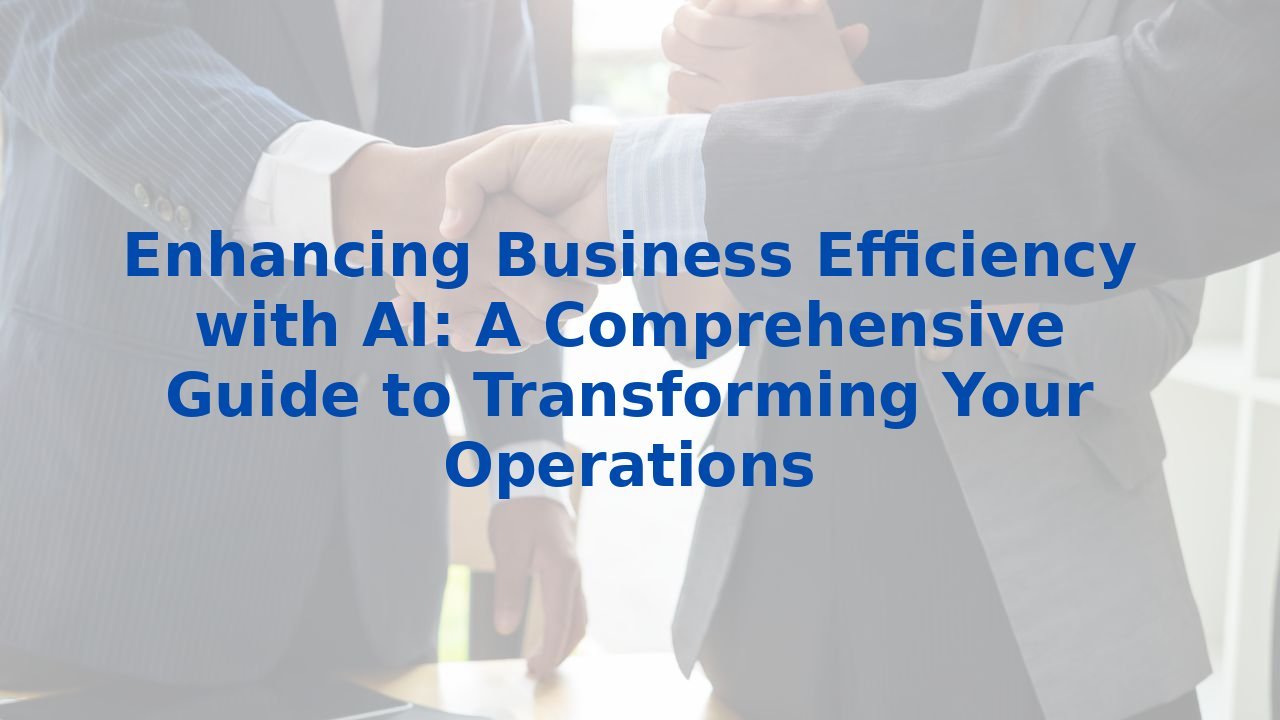Enhancing Business Efficiency with AI: A Comprehensive Guide to Transforming Your Operations
Enhancing Business Efficiency with AI: A Comprehensive Guide to Transforming Your Operations
In today’s fast-paced business landscape, efficiency isn’t just an advantage; it’s a necessity. Organizations are constantly searching for innovative ways to streamline their operations and maintain a competitive edge. Enter Artificial Intelligence (AI)—a transformative force capable of redefining how we operate. This guide explores the ways AI can enhance various business processes, illustrating the profound benefits of this technology for improving efficiency within your organization.
Automating Routine Tasks
At the heart of efficiency lies automation. One of the first places AI can make a substantial impact is in the automation of routine and repetitive tasks. Tasks such as data entry, inventory management, and customer support can be seamlessly handled by AI-driven solutions. Imagine a world where invoices are automatically extracted and data entered with minimal human intervention. Less manual work means fewer errors, faster processes, and more time for your teams to concentrate on what truly matters—strategic initiatives.
AI-powered chatbots revolutionize customer interactions by providing instant responses to common inquiries. This not only enhances customer satisfaction but also allows human agents to focus on complex issues that require personal touch and problem-solving skills. In essence, AI frees your workforce from tedious tasks, enabling them to drive value in more significant ways.
Unlocking Insights with Advanced Data Analytics
Data is the new oil, but like oil, it needs refinement to unlock its true potential. AI excels in data analytics, offering businesses the ability to extract actionable insights from vast repositories of information. By analyzing customer behavior across different channels, AI can help tailor marketing strategies and predict future trends. This leads to more personalized offerings that resonate with your audience.
Furthermore, AI can scour the internet—sifting through social media and news platforms—to identify emerging trends, subsequently empowering businesses to remain agile in their decision-making processes. This capability to harness and analyze data transforms the way organizations strategize, fostering an ability to pivot swiftly in response to a shifting market landscape.
Predictive Maintenance and Operational Reliability
For organizations relying on physical assets, AI plays a game-changing role in predictive maintenance. By continuously monitoring equipment performance, AI systems can predict potential failures before they occur. This proactive approach not only minimizes downtime but also slashes maintenance costs. With a focused maintenance strategy, your organization can deploy resources more intelligently, ultimately leading to an extended lifespan for equipment and enhanced workplace safety.
Optimizing Processes for Maximum Efficiency
Every organization has its workflows, but they aren’t always optimized for efficiency. The power of AI lies in its ability to analyze these processes, identifying bottlenecks and inefficiencies that could be streamlined. By leveraging AI, businesses can automate repetitive processes, eliminate manual errors, and even re-engineer workflows for improved performance. The results? Organizations can reduce operational costs while enhancing overall productivity—allowing teams to focus on refining their competitive advantages.
Creating Personalized Customer Experiences
In an era where customers crave personalization, AI capabilities shine brightest. With the ability to analyze extensive datasets, AI understands when and how to engage customers effectively. It can tailor product recommendations based on individual preferences, past purchases, and browsing behavior. This kind of targeted approach fosters deeper customer loyalty and satisfaction, setting the stage for long-lasting relationships.
Boosting Employee Productivity
AI’s impact on efficiency extends beyond organizational processes to also encompass employee productivity. By automating mundane tasks and providing intelligent support tools, AI empowers employees to concentrate on tasks that drive creativity and innovation. For example, AI can assist with meeting scheduling and report generation, offering employees the gift of time.
Training employees on how to leverage AI tools effectively is critical if organizations want to realize the full potential of these technologies. Training programs should be designed to guide employees through AI functionalities and how to integrate insights into their daily workflows. This not only aids in decision-making but also fosters a culture of continuous improvement and learning within teams.
Conclusion
The pathway to enhanced efficiency within an organization is paved with AI-driven solutions. By embracing automation, unlocking insights through analytics, and optimizing processes, businesses can streamline their operations and focus on strategic, high-impact initiatives. From predictive maintenance that ensures reliability to personalized customer experiences that cultivate loyalty, AI is positioned as a critical resource in today’s business realm.
As organizations navigate this digital landscape, the integration of AI into workflows will be pivotal in achieving sustained success. Understanding and utilizing AI effectively unlocks unprecedented levels of efficiency—rest assured, those who can harness this technology are poised to thrive.
For a deeper dive into how you can harness AI for your organization, explore a range of training solutions designed to equip your workforce with the necessary skills to succeed in this AI-driven era. Check out our offerings for comprehensive AI training tailored to your needs.



